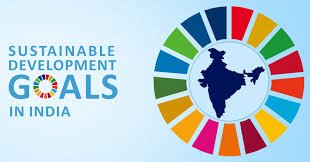India’s Commitment to Sustainable Development Goals (SDGs)
Introduction to India’s SDGs
India has made significant strides towards achieving the Sustainable Development Goals (SDGs) established by the United Nations. As one of the world’s most populous countries, India’s approach to sustainable development is crucial for both its own future and global progress. The SDGs, a set of 17 global goals, aim to tackle issues ranging from poverty and inequality to climate change and environmental degradation.
India’s Progress in Achieving SDGs
India’s commitment to the SDGs is evident through various national policies and initiatives. The Indian government has integrated SDGs into its national planning processes, ensuring that development efforts align with these global targets. Key areas of focus include improving education, reducing poverty, and promoting clean energy. Recent reports indicate that India has made notable progress in areas such as renewable energy deployment, poverty reduction, and health care improvements.
Challenges Faced by India
Despite the progress, India faces several challenges in meeting all 17 SDGs. These challenges include regional disparities in development, inadequate infrastructure in rural areas, and the need for more sustainable practices in agriculture and industry. Addressing these issues requires concerted efforts from both the government and the private sector, as well as increased awareness and participation from the general public.
Government Initiatives and Policies
The Indian government has launched several initiatives to advance the SDGs. Programs like the Pradhan Mantri Jan Dhan Yojana (PMJDY) aim to increase financial inclusion, while the Swachh Bharat Mission focuses on improving sanitation and hygiene. Additionally, the National Clean Energy Fund supports the development of renewable energy technologies. These initiatives are designed to address specific SDGs and contribute to India’s overall development strategy.
Role of International Cooperation
International cooperation plays a critical role in achieving SDGs. India collaborates with various international organizations and countries to leverage global expertise and resources. Partnerships with the United Nations and other international bodies help India access technical assistance and financial support for sustainable development projects.
Why This News is Important
Significance for India’s Future
India’s pursuit of the SDGs is pivotal for its future development. Achieving these goals will lead to improved living standards, economic growth, and environmental sustainability. As India is a major player in the global arena, its success in meeting the SDGs will contribute significantly to global efforts to address pressing issues such as climate change and inequality.
Impact on Policy and Planning
The focus on SDGs influences national policies and planning. By aligning development strategies with SDGs, India ensures that its growth is inclusive and sustainable. This approach helps address systemic issues and promotes equitable development across different regions and sectors.
Global Reputation and Leadership
India’s commitment to SDGs enhances its global reputation as a responsible and progressive nation. By actively participating in international sustainability efforts, India positions itself as a leader in global development, which can strengthen diplomatic and economic ties with other countries.
Historical Context:
Background on India’s Sustainable Development Goals
Introduction to the SDGs
The Sustainable Development Goals were adopted by all United Nations Member States in September 2015, as part of the 2030 Agenda for Sustainable Development. These goals provide a framework for addressing global challenges and promoting sustainable development.
India’s Commitment to Global Goals
India has been an active participant in global initiatives aimed at promoting sustainable development. The country’s commitment to the SDGs is reflected in its national policies and strategic plans, which align with the global agenda.
Evolution of National Policies
Over the years, India has developed various policies and programs to address issues related to sustainable development. These include initiatives to improve education, healthcare, and environmental sustainability. The integration of SDGs into national planning processes marks a significant shift towards more comprehensive and sustainable development strategies.
Key Takeaways from India’s Commitment to SDGs
| Serial Number | Key Takeaway |
|---|---|
| 1 | India is actively working towards achieving the 17 Sustainable Development Goals set by the United Nations. |
| 2 | Significant progress has been made in areas such as renewable energy deployment and poverty reduction. |
| 3 | Challenges include regional disparities and the need for more sustainable agricultural and industrial practices. |
| 4 | Government initiatives like PMJDY and Swachh Bharat Mission are designed to address specific SDGs. |
| 5 | International cooperation is crucial for supporting India’s efforts and accessing global expertise and resources. |
Important FAQs for Students from this News
1. What are the Sustainable Development Goals (SDGs)?
The Sustainable Development Goals are a set of 17 global goals established by the United Nations in 2015, aiming to address a range of global challenges including poverty, inequality, climate change, environmental degradation, peace, and justice. They are part of the 2030 Agenda for Sustainable Development.
2. How is India progressing towards achieving the SDGs?
India has made notable progress in several areas such as renewable energy, poverty reduction, and healthcare improvements. However, challenges remain, including regional disparities and the need for more sustainable practices.
3. What are some key government initiatives in India related to SDGs?
Key initiatives include the Pradhan Mantri Jan Dhan Yojana (PMJDY) for financial inclusion, the Swachh Bharat Mission for sanitation, and the National Clean Energy Fund for renewable energy development.
4. Why is international cooperation important for India’s SDGs?
International cooperation provides India with technical assistance, financial resources, and global expertise, which are essential for implementing and scaling sustainable development projects.
5. How does the pursuit of SDGs affect India’s global standing?
India’s commitment to the SDGs enhances its reputation as a responsible and progressive nation, potentially strengthening its diplomatic and economic relations with other countries.

